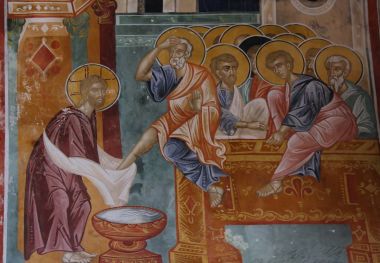Are Christian leaders even reading the same Bible as the Church?

Growing up with a strict father who had been a senior military officer in China during the pre-Communist era meant that academic success and driving ambition were instilled into me from a young age.
At university there was only one goal - to become a successful research scientist. But God had other plans. It was at university where my Christian faith began to deepen. For the first time in my life, I understood clearly the meaning of my call to follow Jesus - self-denial and dying to one's ambitions and dreams (Mark 8:34; John 12:24–26).
It is a spiritual battle that we all face throughout our lives, against our ambition and pride, and it is a battle that does not end even when a person surrenders to God's call to the full-time vocational ministry. It is a battle that we don't always win, but God can still use our weakness to bring his purposes to pass.
This conflict can come to the fore or intensify particularly when we become leaders or enter positions of prominence in the church or at a Christian organisation. Despite our best intentions, our ambitions can assert themselves in various ugly ways, especially when the rules of the game are often defined by competition and public success. However much we talk about seeking to glorify God in our ministry, the ever-present temptation to 'steal God's glory' for ourselves lurks inside all of us.
Often our supporters can unintentionally become our worst enemies internally as we allow their flattery to feed our ego, and their willingness to put us on a pedestal encourages us to develop messianic complexes. Many examples of leaders swallowing their own 'hype' exist throughout history, both inside and outside of the church.
What has troubled me deeply over my years in ministry is that so many individuals I've known were striving to be leaders and to be known as leaders, as if that was the goal of the Christian life. The problem is, how many true servants exist at the top of the pile?
Many of these leaders are being cheered on by thousands of Christian publications, and write seminars on how to become successful leaders in the kingdom of God, even though the Bible's constant emphasis is on being faithful and obedient servants. Sometimes I wonder, are we even reading the same Bible?
More recently, we have witnessed the flood of revelations concerning leadership failures throughout the global church. These include power and financial abuses among megachurch pastors, sexual sin among Catholic priests and Protestant preachers, politicking for advancement and promotion, and so on.
With the constant drumbeat about leadership in the modern church patterned on secular models, encouraging and even sanctifying self-seeking ambition and celebrity status, could it be that we are largely blinded to the serious leadership crisis facing the church today? We need to listen to the call to return to servanthood - not servant leadership - and understand it as the heart of Christian ministry.
My concern is also missiological. Sometime around 1980, the centre of gravity in the global church moved out of the West towards Majority World nations, where two-thirds of all Christians in the world live today. Despite the amazing growth of the churches in the Majority World in the past century, discipleship and leadership are major challenges confronting us.
It used to be said, with some exaggeration, that the church in Africa is three thousand miles wide and one inch deep. The truth is that this is a challenge facing the whole global church today, including the West, but especially the younger churches in Africa, Asia, Latin America, and the MENA (Middle East and North Africa) region.
The shift of the centre of gravity of the global church into the Majority World confers a greater degree of responsibility upon these churches. And only if those of us in these churches adequately address the challenges of discipleship, and recover the spirit of true servanthood, can our churches fully mature into what God intends them to be. Only then will we be able to embrace fully our God-given responsibilities for this generation.
To counter these leadership challenges and become true servants, we need to resolve from the very beginning to fight pride and personal ambition through dying to self and seeking constantly the path of humility. Setting aside time to cultivate a life of prayer is integral to this process. We must stop thinking of ourselves as 'the leader without whom nothing moves', for that is a sure recipe for megalomania if ever there was one!
It is good to remind ourselves of Jesus's parable about the "Unworthy Servant." When we have done everything that our office or position requires of us, even if we are highly successful, we are still unworthy servants who "have only done what was our duty" (Luke 17:10).
To find out more about how Langham Partnership support the development and theologically mature Christian leaders visit: https://uk.langham.org
Bishop Hwa Yung is Bishop Emeritus of the Methodist Church in Malaysia and principal of Malaysia Theological Seminary.











